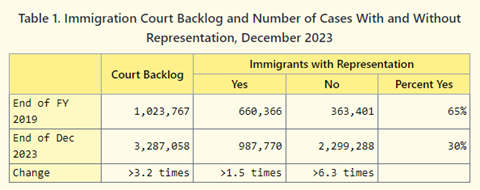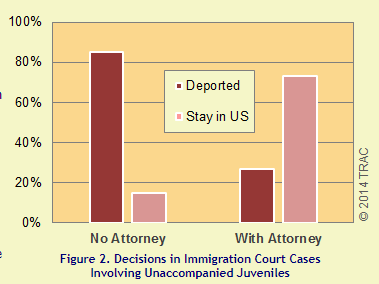When facing U.S. immigration issues, you aren’t legally required to hire an immigration lawyer. Many people handle immigration cases themselves, especially when the situation seems straightforward. However, specific scenarios may benefit from the expertise of a licensed attorney. This blog will explore when and why hiring a lawyer can be the best option and how to choose the right one.
Do I Need an Immigration Lawyer?
Immigration law does not require you to have legal representation. However, pursuing legal services from a professional might help, depending on your case. Here are some factors to consider:
- Complexity of Your Case: If you apply for permanent residency through standard USCIS forms, you may not need an attorney. However, if your case involves complex issues like DACA or deportation risks, seeking advice from an experienced immigration attorney is essential.
- Potential Consequences: If the outcome could drastically affect your status or lead to deportation, having a lawyer advocate for you is critical. On the other hand, you may be able to handle cases with minimal consequences, like travel delay, yourself.
- Time and Resources: Handling your immigration process without a lawyer may be possible if you know the system. However, you should find an attorney if you are unsure or lack the resources.
Why Hire a U.S. Immigration Lawyer?
Even if you are not required to hire one, It is best to find lawyer for US immigration. Here’s why:
- Spotting Potential Issues: Lawyers are trained to identify problems that can lead to a denial or deportation. They help prevent costly mistakes.
- Navigating Complex Immigration Law: Immigration laws are intricate and change frequently. An attorney can help you understand which visas or green cards you are eligible for.
- Monitoring Your Case: Immigration processing delays occur often. A lawyer can track your case and follow up with USCIS.
- Representation: If you are called for an interview, a lawyer can help you prepare. And if you end up in removal proceedings, a lawyer will represent you, giving you the best chance of success.
Source: Americanimmigrationcouncil.org
At every stage in immigration court proceedings, representation is associated with considerably more successful case outcomes.
How to Find the Right Lawyer
Finding the right immigration lawyer is crucial in ensuring a smooth and successful resolution of your immigration case. Here is a guide on how to effectively search for an immigration lawyer that suits your needs:
1. Ask for Referrals
One of the best ways to start your search is by asking for referrals from friends, family, or colleagues who have had similar immigration experiences. Personal recommendations can provide insight into the lawyer’s professionalism, communication style, and success rate.
Additionally, if you have a lawyer for other legal matters, they may be able to refer you to a colleague specializing in immigration law. Lawyers often have networks within their local or national bar associations and can connect you with trusted professionals.
2. Contact Lawyer Bar Associations
Bar associations can be excellent resources for finding an immigration lawyer. Many state and local bar associations offer lawyer referral services, which can connect you with qualified immigration lawyers in your area.
For specialized assistance, the American Immigration Lawyers Association (AILA) is a great resource. AILA is a national organization of immigration attorneys that often provides specialized referral services. Their members have experience in various immigration cases, from family-based immigration to deportation defense.
When using Bar Association referral services, specify the immigration help you need – for work visas, asylum, or family reunification. Specialized services can help narrow your search to lawyers who are experts in your immigration area.
3. Research Lawyers Online
If you do not have any personal referrals, the Internet can be a valuable tool for finding immigration lawyers. Many law firms have websites detailing their areas of expertise, client testimonials, and success stories. You can also verify the lawyer’s credentials, such as their bar license, to ensure they can practice law in your state.
When reviewing online profiles, look for information about the cases the lawyer has handled. For example, suppose your immigration issue is related to a work visa. In that case, it’s best to choose a lawyer with experience in employment-based immigration cases rather than one specializing in asylum or deportation defense.
4. Avoid General Practitioners
Immigration law is highly specialized and constantly evolving. Hiring a lawyer who handles many different types of cases (a general practitioner) may not be in your best interest. General practitioners may not be up-to-date on the latest immigration policies and changes in law, which could affect the outcome of your case.
Instead, seek an immigration lawyer or a specialized attorney within a general practice law firm dedicated to handling immigration cases. Specialization ensures that the attorney has the depth of knowledge necessary to navigate the immigration system.
5. Verify Their Experience
Before making your final decision, it is vital to assess the lawyer’s experience with cases similar to yours. Ask how many cases like yours they have handled and inquire about their success rate. Experience with a similar case is crucial if your matter is complicated or you face severe consequences like deportation.
An experienced immigration lawyer should be able to explain past strategies that have worked for clients in similar situations. They should also be familiar with immigration court procedures, USCIS guidelines, and relevant laws that could impact your case.
Source: TRAC.edu/reports
A recent report exposes the challenge of finding representation. The Court backlog has increased more than three-fold since September. This also means that three times as many immigrants need attorneys.
Initial Immigration Consultation and Costs
Once you have narrowed down your options, contact the lawyer. Many offer free consultations to discuss your case and the fees involved. This meeting allows you to ask detailed questions about your case and assess whether the lawyer is a good fit for you. Ask about their fee structure, how they handle cases, and the estimated timeline for resolving your immigration issue. Typically, lawyers will either charge a flat fee or an hourly rate, depending on the nature of the case.
When you meet with an immigration attorney for a consultation, the session follows a general structure, though every case is unique. The consultation is designed to help the attorney understand your situation and guide you on proceeding. Here is what to expect:
- Explaining Your Situation: You will begin by defining what you need help with. Whether you seek assistance with a visa, green card, deportation defense, or any other immigration-related issue, this is your chance to provide the attorney with a clear picture of your circumstances.
- Attorney’s Questions: The attorney will ask several questions to get more details about your situation. These questions are essential for understanding your case and offering accurate legal advice. The more specific information you can provide, the better.
- Expectations: Once the attorney understands your case, they will give you an overview of what to expect moving forward. The overview may include potential challenges, timelines, and possible outcomes.
- Your Questions: Toward the end of the conversation, the attorney usually allows you to ask any additional questions you may have. Of course, you can ask questions throughout the consultation if anything is unclear or needs further explanation.
Common Questions the Attorney Will Ask
During your consultation, the attorney will ask questions to clarify your legal situation. While many questions will be specific to your case, some standard questions you might encounter include:
- What is your current immigration status?
- When did you enter the United States, and under what visa or permit?
- Have you been deported or removed from the United States in the past?
- What is your current employment situation?
- Do you have any family members who are U.S. citizens or lawful permanent residents?
- Have you ever been arrested, charged with a crime, or convicted of a criminal offense?
Are there any other immigration-related issues you are facing?
Questions to Ask During the Initial Consultation
In your quest to find lawyer for US immigration, asking some essential questions during the initial consultation can help you further assess whether a lawyer is a good fit. You could include questions like:
- How will we communicate throughout the process?
- What are the potential challenges and outcomes of my case?
- How often do you handle cases like mine?
- Will you personally handle my case, or will it be passed to another attorney or team member?
- What is the best strategy for my case?
- How will we be communicating throughout the process?
Getting Legal Guidance from an Immigration Attorney
Once the attorney understands the details of your situation, they will give you their professional opinion on how best to proceed. They will outline your options, offer advice on what steps to take next, and give you an idea of the possible outcomes you might face. For example, suppose you are applying for a family-based green card. In that case, the lawyer will explain the application process, wait times, and any potential issues that could delay or complicate the case.
They will also discuss costs, timelines, and any supporting documents or additional information you must provide to strengthen your case. The consultation will give you a clearer understanding of your legal situation and the steps you need to take.
Source: TRAC.edu/reports
A report shows that in almost three out of four (73%) of the immigration cases in which a child was represented, the court allowed the child to remain in the United States.
Seeking Legal Help Without Fear
Anything you share with your attorney during your consultation is confidential. Lawyers are bound by law to maintain client-attorney privilege, which means they cannot disclose anything you discuss without your permission, with very few exceptions.
One of the biggest concerns for undocumented immigrants is the fear of being reported to immigration authorities, such as U.S. Immigration and Customs Enforcement (ICE) or U.S. Citizenship and Immigration Services (USCIS). Rest assured, immigration attorneys are not required to and will not turn you over to the authorities. You can safely seek legal counsel without worrying about deportation due to your consultation.
The only exception to this confidentiality rule is if the attorney believes you may harm yourself or others. However, outside of this specific situation, you can be assured that your conversations with your attorney are private. If unsure, you can ask the attorney to confirm that what you say is privileged communication.
Immigration lawyers are there to assist you, provide you with options, and protect your rights. If you are facing a difficult situation, an experienced immigration attorney can help you through it and ensure that you understand your options moving forward.
Beware of Non-Lawyers Offering Legal Services
It is essential to avoid ‘consultants’ or ‘notarios’ who claim they can help with U.S. immigration. These individuals are not qualified or licensed to provide legal representation. In some countries, notarios are legal professionals, but in the U.S., a notary public is not competent to give legal advice or handle immigration cases. Hiring non-lawyers for immigration matters can lead to costly mistakes or gross legal consequences. Always work with a licensed, experienced immigration lawyer.
FAQ: How to Find an Immigration Lawyer
1. Do I need to hire an immigration lawyer?
No, you are not legally required to hire an immigration lawyer. However, having one can significantly improve your chances of success, especially in complex cases like deportation defense or asylum applications.
2. How can I find a reputable immigration lawyer?
Start by requesting referrals from friends, family, or your legal network. You can also contact your state’s bar association or the American Immigration Lawyers Association (AILA) for referrals to qualified immigration lawyers.
3. What should I look for when researching an immigration lawyer online?
Look for lawyers who specialize in the specific type of immigration case you have, such as work visas, family-based immigration, or asylum. Check their experience, client testimonials, and disciplinary records to ensure they are licensed and reputable.
4. Why should I avoid hiring a general practitioner for my immigration case?
Immigration law is complex and constantly changing. General practitioners may not be as knowledgeable or up-to-date on specific immigration regulations, which could negatively impact your case. It is better to hire a specialist who focuses solely on immigration law.
5. What should I ask during my consultation with an immigration lawyer?
During the consultation, ask about the lawyer’s experience with cases like yours, their fee structure, the expected timeline for your case, and how they communicate with clients. Make sure they can explain how they would approach your case and what strategies they would use.
6. How much does an immigration lawyer typically cost?
The cost varies depending on the complexity of your case and where you live. Some lawyers charge a flat fee for immigration cases, while others bill by the hour. The costs will depend on the nature of the case and the lawyer’s experience.
7. Can I use a notary or consultant instead of a lawyer for my immigration case?
No, it is crucial to hire a licensed immigration lawyer. Notarios and consultants are not qualified to provide legal advice or represent you in court, and using their services can lead to severe mistakes or even deportation.
8. What should I prepare for my first meeting with an immigration lawyer?
Gather all relevant documents related to your immigration status, such as visas, passports, USCIS correspondence, court documents, and any records of previous interactions with immigration authorities. Be ready to discuss your immigration history in detail.
Conclusion
Hiring the right attorney could be the key to your immigration success. When it comes to immigration law, there is a lot at stake, and having the proper legal support ensures that you are prepared for whatever comes next. If you need to find lawyer for US immigration, take the time to carefully select the best legal professional to guide you through the process.
About Immigration Question
ImmigrationQuestion.com is a revolutionary platform that connects immigration attorneys to people who have immigration-related enquiries. We provide guidance on U.S. visas, citizenship, and green cards, keep you informed with the latest immigration news, and foster a knowledgeable community for support and insights.

















